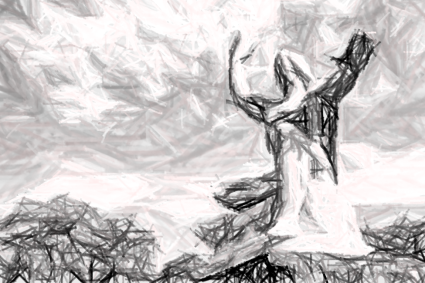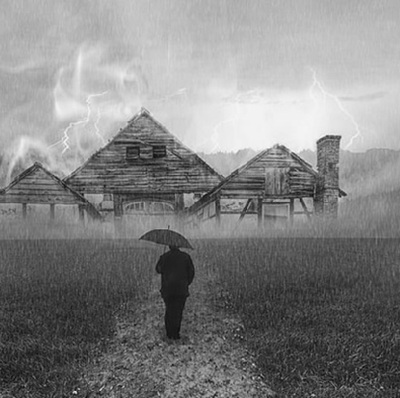.
.
The Sunday Poem is published weekly, and strives to include the poet reading their work.
DH Jenkins reads his poem at its conclusion.
.
.
___
.
.
Nagasaki, Japan/adapted from a photo

.
.
Ambassador
On the 80th year after the dropping
of an atomic bomb on Nagasaki, August 9, 1945
Coltrane was one of the first Americans
to visit Nagasaki
in a way to commiserate shared
International Pain, mixed with shame.
He took a giant step beyond national
war spirit, local Vietnam
Protests, Black power demonstrations—
To become an ambassador of Peace.
When he & his wife deplaned
in Tokyo in 1966,
there was such a crowd of Japanese
that John thought some foreign dignitary
was on his plane;
However, it was Him the crowd
were waiting for.
In the train on arrival at Nagasaki, he
was playing his flute, trying to capture
what he thought was the sound of that city:
the bomb falling through air,
or perhaps the sighs of
80, 000 people exhaling, expiring.
Coltrane knew in his heart that Jazz
is a spiritual art, so arriving in Nagasaki
he went directly to the spot
below ground zero, and said a prayer.
Nearby, a hulking ten meter tall muscular
bronze statue sits with one hand
pointing up to the sky,
the other stretched horizontal w/ the land.
“Peace on Earth” was the second song
he played in concert that night.
Seibou Kitamura, the statue’s creator,
lived until he was 102;
Coltrane, sax player, composer, jazz artist
would perish a year later, almost 41.
.
Listen to DH Jenkins read his poem
.
.
___
.
.

DH Jenkins’ poems have appeared in Jerry Jazz Musician, Kelp Journal, and The Ekphrastic Review. His new book of poetry, Patterns on the Wall, is available on Amazon.com. He lives in New Zealand.
.
.
Listen to the early 1967 recording of John Coltrane performing his composition “To Be,” with Coltrane (flute); Pharoah Sanders (piccolo, tambourine); Alice Coltrane (piano); Jimmy Garrison (bass); and Rashied Ali (drums). [Universal Music Group]
.
.
_____
.
.
Click for:
Information about Kinds of Cool: An Interactive Collection of Jazz Poetry
More poetry on Jerry Jazz Musician
“Saharan Blues on the Seine,” Aishatu Ado’s winning story in the 68th Jerry Jazz Musician Short Fiction Contest
More short fiction on Jerry Jazz Musician
Information about how to submit your poetry or short fiction
Subscribe to the (free) Jerry Jazz Musician quarterly newsletter
Helping to support the ongoing publication of Jerry Jazz Musician, and to keep it commercial-free (thank you!)
.
___
.
.
Jerry Jazz Musician…human produced since 1999
.
.
.















































Mr. Jenkins,
Your poem is first-rate, filled with both pain and compassion, worded with a clarity that makes the visit of Coltrane come alive. The poem also is an excellent history lesson. I salute your achievement. I also enjoyed your reading of the poem: restrained, clear, fully engaged with the poem.
Thanks so much for you comment Mr. Newell. It means a lot to me.